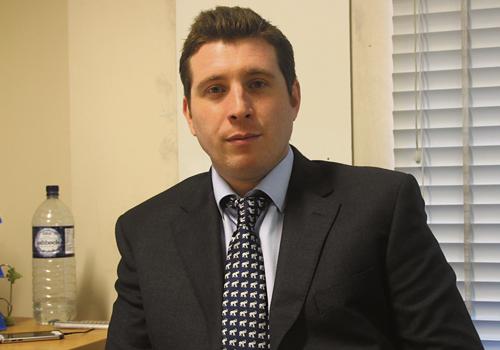Police on the trail of Islington drug dealers with empires in shire towns
Monday, 28th November 2016 — By Koos Couvée

Detective Inspector Will Lexton-Jones: ‘Easy Cash is essentially a business’
AROUND 75 Islington youngsters are known to be involved in a growing and lucrative drug trade run by London gangs in counties as far away as Cornwall, the Tribune can reveal.
The practice, known in police circles as “running county lines”, involves gangs selling drugs, usually crack cocaine and heroin, in towns outside London using a single telephone number people can ring to make orders.
Of the Islington gangs, Easy Cash, also known as EC1, which is active in Finsbury, Clerkenwell and parts of Camden, is most involved in this burgeoning branch of the drugs trade.
Detective Inspector Will Lexton-Jones, who heads Islington Police’s gangs unit, said: “Easy Cash is more of an organised criminal network with a hierarchy and a strategy. It’s essentially a business.
“They are not as harmful [in terms of violence] as some of the other gangs. Being involved in violence is seen as a business risk.”
According to the National Crime Agency, a county drugs line is often guarded closely and kept well away from the location where drugs are sold. For instance, a delivery system involving locally-based runners could be coordinated from London.
In other cases, where a group is perhaps more loosely organised, criminals engage in what is known as “cuckooing” – setting up shop in the house of a drug addict or vulnerable person by intimidating them and giving them drugs.
Based on arrests made in 15 counties as far away as Cornwall and Devon, Islington youngsters involved in county lines are most likely to be aged 18 or 19.
DI Lexton-Jones said the youngsters in Islington tended to get involved because of “financial incentives”
“I have not personally seen direct evidence or intelligence that coercion influences young people running county lines,” he added. “But we are working extremely hard to close any intelligence gaps to understand the issue as thoroughly as possible.”
There is a cohort of known 14- to 15-year-olds involved, but this is made up of fewer than 10 people out of 75 known offenders.
There has been an arrest of an 11-year-old but this was an isolated case, DI Lexton-Jones said.
“Targeting top-tier gang members is and always will be part of police tactics and is considered core business for some of our specialist crime units,” he added.
“For local gangs teams it is often of greater value to target street-level serious violence than undertaking protracted and very resource-intensive operations on senior members who are immediately replaced.”
Islington has several active gangs, including Andover (named after the estate in Finsbury Park), Elthorne (the Archway council estate), Red Pitch in the east of the borough, and Easy Cash. Cally (Caledonian Road) and Essex Road, who are locked in a violent turf war with Red Pitch, have virtually merged, according to the Met.
“People talk about gangs in general terms but there’s a broad range of set-ups,” DI Lexton-Jones said. “It could simply be a peer group that has no organisational structure.”
Red Pitch, for instance, are far less organised and also far less involved in running county lines, the DI said.
To deal with the problem, DI Lexton-Jones said the Met is moving towards a “less reactive and more proactive” way of working, focused on diverting youngsters away from the drug trade rather than simply locking people up after a crime has occurred.
“We need to respond across the partnership, sharing information across forces and focus on diversion and intervention of offenders,” he said.
“The integrated gangs team [working with Islington’s youth offending service] is also very important and has been successful. And we have the Safer Schools Forum in primary schools, which starts [educating children] about stranger danger all the way to knife crime.
“We are trying to do the end-to-end piece. And if you cannot divert [young offenders] then there’s enforcement.”
‘Target the gangmasters who are enslaving boys’
SCHOOLS and young people chief Joe Caluori has urged the Met to target the older organisers of the drug networks using anti-slavery legislation rather than just arresting the young people involved.
“The gang problem in Islington is about older men grooming boys into offending,” the councillor said.
“We see young people getting arrested in other parts of the country, kids who haven’t had the best start in life, and someone has organised that.”
“Police need to target those gangmasters. They’re enslaving boys, creating debt, organising for people to get robbed [so they have to work to pay off a drug debt].”
He added: “Youngsters take all the risk of getting arrested or stabbed and often hide drugs [up their rectum], taking huge risks with their health.
“We need a high level of activity to disrupt boys involved in county lines drug dealing.
“We need national and regional resources and we have to have a safeguarding policy. We have to regard these young people as victims, not as ‘soldiers’.”